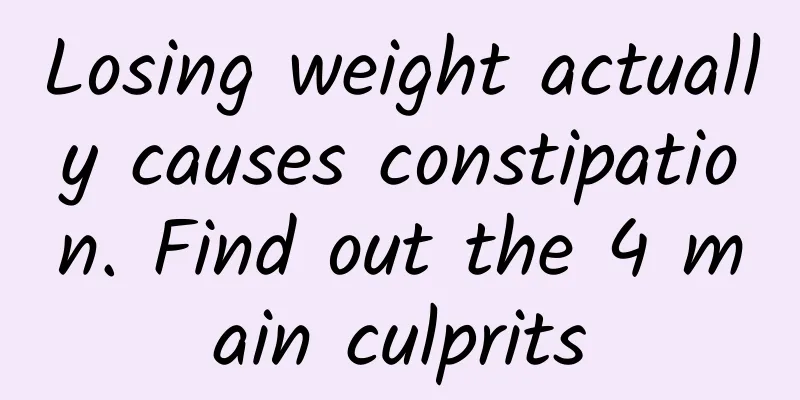Losing weight actually causes constipation. Find out the 4 main culprits

|
After food enters the body, it will become a puree after chewing, the action of stomach acid and digestion and absorption in the small intestine. The nutrients in the food will enter the blood circulation in the small intestine and be transported throughout the body. Other food residues will continue to be transported down to the large intestine. Water will be recycled and reused in the large intestine, while other waste products of no use value will be dehydrated in the large intestine and compressed into solid feces and excreted from the body. Under normal circumstances, food stays in the large intestine for about 24 to 36 hours, slowly recycling the water and other useful substances in the feces. So as the time spent in the large intestine increases, the feces will become drier and drier. Basically, the feces will change from a muddy and semi-solid state containing more water to a solid state before being excreted from the body. Therefore, if you don't have a bowel movement for a long time, the moisture in the food will be lost, making the feces dry and hard to pass, causing pain during defecation. In addition, the dry and hard feces may scratch the intestinal mucosa during the pushing process, causing blood in the feces. Constipation is characterized by hard and dry stools, painful and uncomfortable bowel movements. Constipation Deciphered~Understand the four major causes of constipation! Generally speaking, there are only a few reasons for constipation: insufficient stool mass, poor intestinal motility, and lack of intestinal lubrication. 1. Reduced food volume leads to insufficient fecal mass In the process of losing weight, people often choose simple and refined food for convenience (for example, eating simple foods such as toast, soda crackers, milk or boiled eggs); or simply reduce the amount of food in order to lose weight, thereby reducing the volume of food and correspondingly reducing the volume of feces, which makes constipation a problem. This type of constipation is mainly due to the reduction in stool volume, so this problem can be improved by increasing the amount, such as increasing dietary fiber intake. Fiber mainly comes from vegetables and fruits. Because fiber can absorb water and swell, or stimulate intestinal peristalsis, it helps defecation and improves intestinal problems such as constipation and hemorrhoids. This is why when it comes to constipation, the doctor will tell you to eat more vegetables and fruits. Workaround Eat more high-fiber foods: In addition to increasing the intake of vegetables and fruits, whole grains and root vegetables are also high-fiber foods, so you can use germ rice or whole-grain rice to replace white rice, or you can cook sweet potatoes, taro, or red bean soup, mung bean soup, etc. as snacks (use sugar substitutes instead of high-calorie sugar). Or take additional fiber supplements. 2. Poor intestinal motility Under normal circumstances, the intestines will continue to move, moving feces toward the anus. However, lack of exercise, too few good intestinal bacteria (beneficial intestinal bacteria will stimulate intestinal peristalsis) or lack of vitamin B1 can reduce intestinal peristalsis. If the intestinal motility is poor, the water in the stool will be constantly drained away by the large intestine, making the stool harder and more difficult to pass, resulting in constipation. Workaround 1. Benign bacteria in the intestines are dominant. You can directly take probiotic supplements, or consume foods containing probiotics such as lactic acid bacteria (this type of food is quite high in calories, so those who are losing weight should be careful when consuming it), and eat more foods that help the reproduction of good bacteria, such as oligosaccharides or fiber. 2. Eat more foods that can stimulate intestinal peristalsis. You can eat more papaya, banana, plum, prune, candied dates and other fruits that can help defecation. Or drink plum, prune or candied date juice on an empty stomach when you wake up in the morning to stimulate intestinal peristalsis. 3. Moderate exercise - Insufficient exercise will weaken the abdominal muscles needed to push out feces, and the intestinal peristalsis will be weakened, so even if the child feels the urge to defecate, he or she will not be able to defecate. Therefore, it is recommended to increase the amount of exercise for the child to strengthen the peristaltic function of the intestine. 3. Lack of lubrication in the intestines During the weight loss process, if you do not drink enough water, or if you significantly reduce your intake of fat in your food due to weight loss, your intestines may lack lubrication and cause constipation. The solution to the problem is to drink more water. Sufficient water can soften stools and moisturize the intestines, so it is recommended to drink 2000~2500cc of water every day to help defecation. However, alcohol or caffeine can be diuretic, so they should be consumed in moderation. 4. Bad habits In addition to the reasons mentioned above, many people's constipation is caused by bad habits, such as holding back the urge to go to the toilet, ignoring the urge to defecate or having an unbalanced diet, lack of nutrients such as fiber or B vitamins, etc. Basically, defecation follows certain physiological rules. Under certain conditions, the body will automatically feel the urge to defecate. If you can take advantage of this physiological reaction, it is not difficult to develop regular bowel movements. Here are two times when you are more likely to feel the urge to defecate: When we eat our first meal every morning, there will be a so-called "gastrorectal reflex". Simply put, as long as the food enters the stomach, the rectum (the large intestine, where defecation occurs) will have a reflex peristaltic reaction (the urge to defecate). Therefore, after breakfast, it will be easier to go to the toilet if you find time to do so. Another time when you feel the urge to defecate is when you consume certain foods. As long as the food reaches a certain amount, it will stimulate the intestines and cause the urge to defecate. This is why if you eat less (reduce the amount of food) to lose weight, you are likely to get constipated. The key point that must be paid attention to is that when the body feels the urge to defecate, please go to the toilet immediately, do not hold it in for later. If you often hold the urge to defecate, it will easily lead to constipation. Workaround 1. Eat breakfast and develop regular eating habits. For example, eat three meals at regular times and develop the habit of eating breakfast. Eating breakfast helps intestinal peristalsis. When the breakfast food enters the stomach, it stimulates the peristalsis of the large intestine (called gastrorectal reflex), making us feel the urge to defecate. 2. Don’t force yourself to have a bowel movement (if you have the urge to have a bowel movement, you should have one>_ Say goodbye to constipation with a nutritional supplement! 1. Beneficial bacteria: can ferment carbohydrates to produce acidic substances such as lactic acid or acetic acid, promote intestinal peristalsis and promote defecation. And can inhibit the growth of harmful bacteria. 2. Oligosaccharides (or fructooligosaccharides): Oligosaccharides are not broken down by the body's enzymes, so they can safely reach the intestines after entering the body and become food for beneficial intestinal bacteria such as Bifidobacterium, helping the reproduction of beneficial bacteria and thus maintaining intestinal health. 3. Fiber: In addition to being a favorite food for beneficial bacteria, fiber can also promote intestinal peristalsis and aid defecation. 4. Aloe vera: Contains rhein, which can stimulate the peristalsis of intestinal smooth muscles and make defecation smooth. Low doses can regulate gastrointestinal function, while high doses have a laxative effect. In addition, aloe vera also contains mucopolysaccharides, which can protect the gastrointestinal mucosa and reduce the irritation of gastric acid on the stomach wall. It is a good helper for people with poor stomach. 5. Tea with laxative effect: Many weight loss teas contain laxative herbs such as senna leaves and atractylodes, which have a mild laxative effect and may be another option for those who have difficulty defecating. This article comes from: Nutritionist Stella's Weight Loss & Nutrition Blog ※For more information, please see "Nutritionist Stella's Weight Loss & Nutrition Blog" |
<<: "Liver wrapped in oil" special medicine! Weight loss + health management
>>: There is a golden ratio for weight loss! Nutritionist: This is the right way to eat
Recommend
Mature women with diabetes have excessive waist circumference and difficulty controlling blood sugar
Is it okay if I have a normal weight? Be careful ...
What should women eat for cervicitis? 4 dietary remedies for cervicitis in women
1. Dandelion and lean meat soup: 250g lean pork, ...
Learn to get rid of these causes of irregular menstruation
Female friends are originally feminine, and they ...
What are the dangers of bacterial vaginosis
Bacterial vaginosis is probably familiar to many ...
Eliminate leg fatigue! 4 Steps to Master Seated Forward Bend
Daily detox yoga uses short and simple movements ...
Why is Bartholinitis always difficult to cure?
The main pathogens of Bartholinitis are Staphyloc...
Weight out of control after the New Year! 10 weight loss strategies from nutritionists
How do you spend every day during the joyful New ...
What medicine can be applied to uterine fibroids? Can uterine fibroids be completely eliminated with medicine?
What medicine can be applied to uterine fibroids?...
Snoring, sleepiness, sleep apnea ~ weight loss, side sleeping improvement
Obesity is the root of all diseases. For middle-a...
Where is the best place to have gynecological surgery?
Nowadays, many female friends suffer from gynecol...
What are the symptoms and consequences of adnexitis?
What are the symptoms and consequences of adnexit...
6 key points of intermittent fasting weight loss method
The weight loss method of "fasting with 500 ...
How many days after ectopic pregnancy surgery?
What does ectopic pregnancy mean? What we call &q...
How should women prevent cervical erosion? Six effective measures to prevent cervical erosion
Can cervical erosion be prevented? Many women are...
This is a great idea! Eat with your left hand to control your food intake and lose weight successfully
Who doesn’t know that losing weight means eating ...









